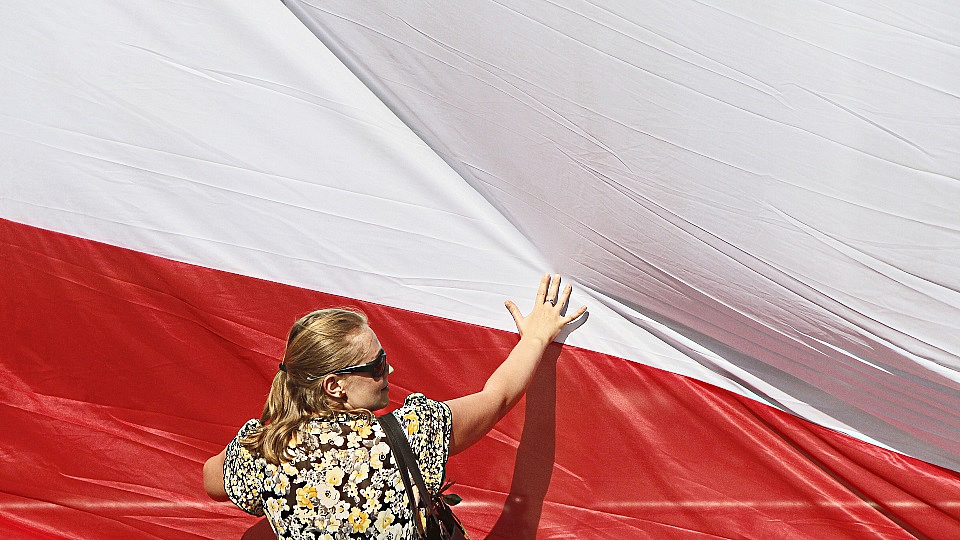It is now time to start worrying about nationalism spreading in countries like Poland and Hungary, says Ian Bond, former UK ambassador to Latvia, currently serving as director of foreign policy at CER.
The Baltic States have not followed suit so far. Yet, there is a high risk that the tendency of western European countries ignoring small member states, such as Latvia, will surge further, said both Ian Bond and Charles Grant, director of CER.
“I think we should be worried about the rise of nationalism in Central and Eastern Europe,” said Ian Bond. Economic integration of the region into European institutions has been extremely successful over the last 27 years to the end of the Cold War: for example, Poland and Ukraine were quite similar in their income per capita at the time of the breakup with the Soviet Union and Poland is now several times richer, according to Bond.
“It is very worrying to see a gulf opening up between Poland and its neighbors. Some attacks from the Polish government on the German government seemed to me very short sighted indeed,” said Mr Bond.
The situation in Poland is in a way different from Hungary, as Prime Minister Viktor Orban is more “opportunistic” rather than ideological as opposed to the PiS (Law and Justice) government, according to Bond. “He says what he thinks will win votes now and if that changes then he changes too. He has gone from somebody who was a free market admirer of Margaret Thatcher to something much darker and more nativist.
Bond said that he had spoken to people in Brussels who deal with the region on a regular basis. “They think that Orban will respond to the pressure from European Union, potentially financial pressure, if they decide to introduce conditionality between the payment of EU funds for development in Hungary and the state of the rule of law in Hungary.” Jaroslaw Kaczynski, the leader of PiS, is unlikely to do the same.
Ian Bond said that what worries him the most is the tendency of nationalists to operate by creating the image that the state is surrounded by enemies: “And if you are not one of us – whatever “us” means – then you are one of our enemies.”
Eastern European nationalism partially feeds on Donald Trump’s presidency, in particular his attitude to allies and European security.
“Allies are not your partners. They are people who are out to get something from you. They are sort of more parasites than partners in the trumpian concept,” said Bond.
“His concept of burden sharing is much more like a firm that provides bouncers for a nightclub, saying to the patrons of the nightclub: we are not going to look after you unless you pay us. It is sort of extortion racket.”
Primarily the focus remains on Poland and Hungary. “When it comes to the Baltic States so far I don’t see evidence of some great wave of nationalism or populism there,” said Bond speaking about a potential spread of the tendency across the region.
Nevertheless, there is a great danger that the Baltic States along with other smaller members will be ignored by France and Germany, said Charles Grant. He mentioned a recent lunch organised by the European Policy Centre, a Brussels-based think-tank.
“I looked around the table and there were about 25 people. Not one of them was from any of the so called new members that joined in 2004, 2007 or 2013. Everybody around the table was west European. I do think there is a danger that Brussels, Paris and Berlin overlook the importance of Central and Eastern Europe. They don’t talk to them enough, don’t travel there enough, they don’t consider their views enough, they don’t try to understand them enough.”
Grant said that is alarming that other large countries like Poland, Spain and Italy play smaller role in the EU dominated by France Germany, while “some smaller countries like Latvia may not be listened to”.
Ian Bond added that while he agrees with this danger, politicians’ personality has a massive role in getting a hearing in the EU. Serious politicians, such as Dalia Grybauskaitė or Edgars Rinkēvičs are absolutely capable of getting themselves noticed and considered.
“I’m afraid it is much easier when Poland is represented by people, who believe in strange conspiracy theories, like the Polish defence minister or have this very antagonistic relationship with the EU like Kaczynski. It is very easy for western politicians then not in fact to examine the substance of what Polish representatives are saying - which may or may not be accurate - but instead to say: well you know these people they are not very serious politicians. Why should we take them seriously?” said Bond.
The EU should improve its efforts on countering disinformation from Russia, as Kremlin is very likely to take advantage of the numerous conflicts and problems between the EU members.
“The conflicts also pose ideal opportunities for Russian mischief making. I see every sign that the Russians will exploit these gaps. And I don’t blame them for doing that. Given the world view that they have of this sort of antagonistic NATO (however little I think that corresponds to reality) if I thought that that is how world was then I also would be trying to make mine adversaries fall out among themselves,” said Bond.





























